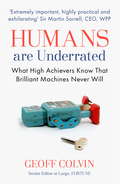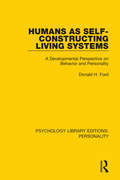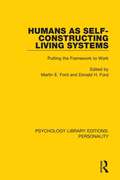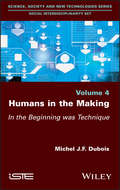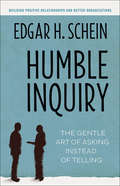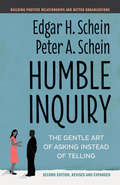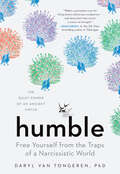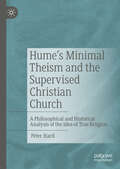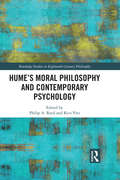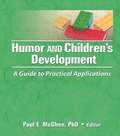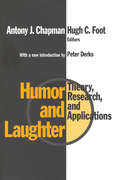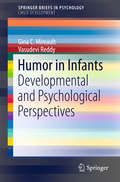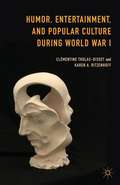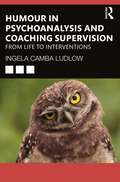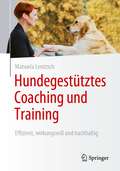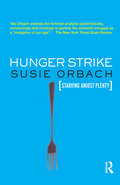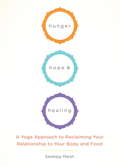- Table View
- List View
Humans Are Underrated: What High Achievers Know that Brilliant Machines Never Will
by Geoff ColvinIn the dawning age of brilliant machines, what will people do better than computers?It's easy to imagine a frightening future in which technology takes over the jobs that we now get paid to do, working more accurately and for barely any cost. Computers can already perform surgery, drive vehicles, write articles and do intricate legal work, so what hope will there be for tomorrow's workforce?Drawing on a wealth of research, Geoff Colvin uncovers the skills that will be in great demand as technology advances - and how they can be developed. In this new machine age, we shouldn't try to beat computers at what they can do. We'll lose that contest. Instead we must look to unlikely places, learn from the best, and cultivate the human abilities that make us unique.
Humans as Self-Constructing Living Systems: A Developmental Perspective on Behavior and Personality (Psychology Library Editions: Personality)
by Donald H. FordOriginally published in 1987, the purpose of this title was to develop a conceptual framework for understanding individual humans as complex, functional entities. It was felt that a sound developmental theory of human personality and behaviour would help synthesize existing scientific and clinical information into a coherent representation of a person as a functional unit, guide future research, and facilitate the work of the health and human services professions. The volume is aimed at a multidisciplinary-multiprofessional audience.
Humans as Self-Constructing Living Systems: Putting the Framework to Work (Psychology Library Editions: Personality)
by Donald H. Ford Martin E. FordOriginally published in 1987, the purpose of this companion volume to Donald Ford’s (1987) Humans as Self-Constructing Living Systems: A Developmental Perspective on Personality and Behavior was to illustrate the potential utility of the Living Systems Framework (LSF) for stimulating new theoretical advances, for guiding research on human behavior and development, and for facilitating the work of the health and human service professions. Although not exactly a "how to" manual, it does provide many concrete examples of how and when the framework can be used to guide scholarly and professional activities. It also provides a concise overview of the framework itself that can help those who have read the theoretical volume refresh their memory, and assist those who have not, in understanding the basic concepts of the LSF and in deciding whether and how the framework might be useful to them.
Humans in the Making: In the Beginning was Technique
by Michel J. DuboisThe human specificity can be described by verticality/bipedalism, technique use, articulated language, high cognitive capacities, complex society at three levels: body, mind, social. In this book, is proposed an evolutionary process that make better understand how such humanity could have emerged in the long time (more than 6 million years). The process is based on a very early necessity to use technic for surviving correlated with neoteny which impulsed a darwinian evolutionary process, with four distinguished punctuation described as neotenizations.
Humble Inquiry
by Edgar H. ScheinThe Key to Effective Communication Communication is essential in a healthy organization. But all too often when we interact with people--especially those who report to us--we simply tell them what we think they need to know. This shuts them down. To generate bold new ideas, to avoid disastrous mistakes, to develop agility and flexibility, we need to practice Humble Inquiry. Ed Schein defines Humble Inquiry as "the fine art of drawing someone out, of asking questions to which you do not know the answer, of building a relationship based on curiosity and interest in the other person." In this seminal work, Schein contrasts Humble Inquiry with other kinds of inquiry, shows the benefits Humble Inquiry provides in many different settings, and offers advice on overcoming the cultural, organizational, and psychological barriers that keep us from practicing it.
Humble Inquiry, Second Edition: The Gentle Art of Asking Instead of Telling
by Edgar H. Schein Peter A. ScheinThis worldwide bestseller offers simple guidance for building the kind of open and trusting relatonships vital for tackling global systemic challenges and developing adaptive, innovative organizations—over 200,000 copies sold and translated into seventeen languages!We live, say Edgar and Peter Schein, in a culture of "tell." All too often we tell others what we think they need to know or should do. But whether we are leading or following, what matters most is we get to the truth. We have to develop a commitment to sharing vital facts and identifying faulty assumptions—it can mean the difference between success and failure. This is why we need Humble Inquiry more than ever. The Scheins define Humble Inquiry as "the gentle art of drawing someone out, of asking questions to which you do not know the answer, of building relationships based on curiosity and interest in the other person." It was inspired by Edgar's twenty years of work in high-hazard industries and the health-care system, where honest communication can literally mean the difference between life and death.In this new edition the authors look at how Humble Inquiry differs from other kinds of inquiry, offer examples of it in action, and show how to overcome the barriers that keep us telling when we should be asking. This edition offers a deepening and broadening of this concept, seeing it as not just a way of posing questions but an entire attitude that includes better listening, better responding to what others are trying to tell us, and better revealing of ourselves. Packed with case examples and a full chapter of exercises and simulations, this is a major contribution to how we see human conversational dynamics and relationships, presented in a compact, personal, and eminently practical way.
Humble: Free Yourself From The Traps Of A Narcissistic World
by Daryl Van TongerenA practical and philosophical deep dive into humility: how it can build confidence, foster honesty about our strengths and limitations, and help us achieve success Daryl Van Tongeren is a leading researcher on the science of humility. In Humble, he gives this unassuming trait a much-needed rebrand, explaining why the humble enjoy a more secure sense of self, handle challenges better, and, indeed, are often the people we like the most. That’s not to say Van Tongeren has mastered humility. (When he asked his wife to rate him on a scale from 1 to 10, she gave him a 4.) But in a world where narcissism is on the rise—where the shameless dominate social media and getting noticed is considered key to getting ahead—it’s not surprising that we all have a bit of work to do on our sometimes self-sabotaging egos. In its true sense, humbleness is the happy medium between self-denial and self-obsession: It grants the holder an accurate view of reality. By seeing where we have room to improve, we can grow. By admitting our doubts, we can learn. And by acknowledging our own worldview as one among many, we can truly connect with others despite our differences. A thought-provoking call to reexamine our values, Humble signals a paradigm shift—from the “self-esteem movement” run amok to a better world in which we lift up one another.
Hume's Minimal Theism and the Supervised Christian Church: A Philosophical and Historical Analysis of the Idea of True Religion
by Péter HartlIn this book, Péter Hartl offers a novel and comprehensive interpretation of David Hume’s philosophy of religion focusing on various notions of ‘true religion’ in Hume’s overall philosophy and how these ideas relate to various early modern positions on religion, society and philosophy. The account consists of both critical and positive parts of Hume’s overall, nuanced position on theoretical, social and political aspects of religion and the philosophical criticism of religion. Hartl criticises the atheist and completely negative readings of Hume’s philosophy of religion. Instead of presenting Hume’s position as either a radical secularist or closet atheist, Hartl’s interpretation builds on the underdeveloped, positive and constructive parts of Hume’s account of (true) religion. For Hume, on the one hand, true religion is compatible with or even vindicates minimal theism, and it forms part of philosophy exemplifying intellectual virtues. On the other hand, Hume has a pragmatic stance on the role of religion in society, according to which the government should control religious institutions to reduce the power of church authorities but to retain some positive social effects of religion.
Hume's Problem Solved: The Optimality of Meta-Induction (The\mit Press Ser.)
by Gerhard SchurzA new approach to Hume's problem of induction that justifies the optimality of induction at the level of meta-induction.Hume's problem of justifying induction has been among epistemology's greatest challenges for centuries. In this book, Gerhard Schurz proposes a new approach to Hume's problem. Acknowledging the force of Hume's arguments against the possibility of a noncircular justification of the reliability of induction, Schurz demonstrates instead the possibility of a noncircular justification of the optimality of induction, or, more precisely, of meta-induction (the application of induction to competing prediction models). Drawing on discoveries in computational learning theory, Schurz demonstrates that a regret-based learning strategy, attractivity-weighted meta-induction, is predictively optimal in all possible worlds among all prediction methods accessible to the epistemic agent. Moreover, the a priori justification of meta-induction generates a noncircular a posteriori justification of object induction. Taken together, these two results provide a noncircular solution to Hume's problem.Schurz discusses the philosophical debate on the problem of induction, addressing all major attempts at a solution to Hume's problem and describing their shortcomings; presents a series of theorems, accompanied by a description of computer simulations illustrating the content of these theorems (with proofs presented in a mathematical appendix); and defends, refines, and applies core insights regarding the optimality of meta-induction, explaining applications in neighboring disciplines including forecasting sciences, cognitive science, social epistemology, and generalized evolution theory. Finally, Schurz generalizes the method of optimality-based justification to a new strategy of justification in epistemology, arguing that optimality justifications can avoid the problems of justificatory circularity and regress.
Hume’s Moral Philosophy and Contemporary Psychology (Routledge Studies in Eighteenth-Century Philosophy)
by Rico Vitz Philip A. ReedRecent work at the intersection of moral philosophy and the philosophy of psychology has dealt mostly with Aristotelian virtue ethics. The dearth of scholarship that engages with Hume’s moral philosophy, however, is both noticeable and peculiar. Hume's Moral Philosophy and Contemporary Psychology demonstrates how Hume’s moral philosophy comports with recent work from the empirical sciences and moral psychology. It shows how contemporary work in virtue ethics has much stronger similarities to the metaphysically thin conception of human nature that Hume developed, rather than the metaphysically thick conception of human nature that Aristotle espoused. It also reveals how contemporary work in moral motivation and moral epistemology has strong affinities with themes in Hume’s sympathetic sentimentalism.
Humility
by Andrew MurrayAn exploration of the life and death of Jesus, a discussion of humility as the distinguishing feature of the discipleship of Jesus Christ, and teaching on how to die to self and live for Christ
Humility
by Andrew MurrayIs your walk with God stale? Are the same old things just not working as you seek intimacy and God's power for you life? In this classic text by faith-great Andrew Murray, you will find refreshment for your spiritual journey and learn that humble dependence on God is the basis of all genuine blessing. In Humility, you will learn to model your life after Jesus' life, find joy in service, and add power to your witnessing. Bring your focus back to God and walk in His will as never before!
Humor and Children's Development: A Guide to Practical Applications
by Paul E Mcghee Mary FrankHere is the first book that is geared toward practical applications of humor with children. Health care professionals, counselors, social workers, students, and parents will find this to be a fascinating, instructive volume that illustrates how to effectively incorporate humor into children’s lives to produce enormously positive results. With a strong “how to” focus, this enlightening volume addresses the use of humor in the classroom--to promote learning and to foster higher levels of creative thinking. Experts who are on the cutting edge of humor and its benefits for children examine the importance of humor in fostering social and emotional development and in adapting to stressful situations. And for the scholarly reader, Humor and Children’s Development documents the major research trends focusing on humor and its development. This excellent resource--certain to spark further debate and research--offers an unrivaled opportunity to further understand children’s behavior and development.Humor and Children’s Development was featured in the February 1990 issue of Working Mother magazine in article titled “Let Laughter Ring!” by Eva Conrad.The chapter entitled “Humor in Children’s Literature” by Janice Alberghene was one of the finalists for the Children’s Literature Association’s Literary Criticism Award for the best critical article of 1988 on the subject of children’s literature.
Humor and Chinese Culture: A Psychological Perspective (Routledge Studies in Asian Behavioural Sciences)
by Xiaodong YueThis book addresses psychological studies of humour in Chinese societies. It starts by reviewing how the concept of humour evolves in Chinese history, and how it is perceived by Confucianism, Taoism, and Buddhism respectively. It then compares differences in the Western and the Chinese perceptions of humor and discusses empirical studies that were conducted to examine such differences. It also discusses the cultural origin and empirical evidence of the Chinese ambivalence about humor and presents empirical findings that illustrate its existence. Having done these, it proceeds to discuss psychological studies that examine how humour is related to various demographic, dispositional variables as well as how humour is related to creativity in Chinese societies. It also discusses how humour is related to emotional expressions and mental health in Chinese society as well. It concludes with a discussion on how workplace humor is reflected and developed in Chinese contexts. Taken together, this book attempts to bring together the theoretical propositions, empirical studies, and cultural analyses of humor in Chinese societies.
Humor and Laughter: Theory, Research and Applications
by Peter DerksHumor and laughter play a vital part in our everyday social encounters. This book is concerned with the exploration of the psychology of humor and laughter by the foremost professional researchers in these areas. It examines the major theoretical perspectives underlying current approaches and it draws together for the first time the main empirical work done over the course of this century. Peter Berks brings this story up to the moment.The two major parts of the book deal with perception of and responses to humor, and its uses in society at large. The chapters themselves range from cognitive aspects of humor development, through the functions of humor and laughter in social interaction, to the use of humor by comedians and by the mass media. One of the general features of the volume is the concern with the variety of techniques and research methods which are used in studies aimed at understanding our responsiveness to humor and the contexts in which we create it.Humor and Laughter contains chapters by psychologists with longstanding research interests in humor and laughter, including Thomas R. Shultz, Mary K. Rothbart, Goran Nerhardt, Michael Godkewitsch, Walter E. O'Connell, and Harvey Mindess. Humor and Laughter presents wide-ranging theoretical, methodological, and empirical perspectives on an important area of human behavior and social interaction. This book should interest many behavioral scientists and practitioners, particularly those in social and clinical psychology, psychiatry, child psychology and education, sociology, and related disciplines.
Humor and Psyche: Psychoanalytic Perspectives
by James W. BarronHumor, a topic that engaged Sigmund Freud both early and late in his career, is richly intertwined with character, with creativity, and with the theory and practice of psychoanalytic therapy. Yet, until very recently, analysts ignored Freud's lead and relegated humor to the periphery of their concerns. Humor and Psyche not only remedies previous neglect of the role of humor in the psychoanalytic situation but opens to a broad and balanced consideration of the role of humor in psychological life. Section I provides historical and theoretical perspectives on the concept of humor. Contributors review Freudian and post-Freudian theories of humor, address the inseparability of humor and play, adumbrate a postmodernist perspective on humor, and focus on the unique cognitive and affective properties of humor. In Section II contributors turn to the relationship of humor to various aspects of the therapeutic process, including the relationship of humor to transference interpretation, the enlivening effects of humor on the therapeutic process, and the multiple meanings of humorous exchanges between therapists and patients. Section III concludes the volume with three fascinating essays on the relationship of humor to character and creativity. They focus, respectively, on the role of humor in the 25-year correspondence of Freud and Sándor Ferenczi, on the interweaving of D. W. Winnicott's comic spirit and theoretical innovations, and on the relationship between humor and creativity in the music of the American composer Charles Ives. Taken together, the contributors reestablish the importance of humor as a topic of psychotherapeutic relevance more than 70 years after Freud's final essay on the topic. Delightfully readable from beginning to end, Humor and Psyche edifies as it entertains.
Humor at Work in Teams, Leadership, Negotiations, Learning, and Health
by Tabea Scheel Christine GockelThis 2nd edition provides a comprehensive, updated review of current knowledge on the adaptive and maladaptive functions of humor. Humor is a pervasive aspect of daily interaction - including in the workplace. Affiliative, self-enhancing, self-deprecating and aggressive humor can all occur at work and have unique and sometimes ambiguous effects. This volume presents research on humor in five important workplace domains: teams, leadership, negotiation, learning, and health. It combines and integrates research from a range of fields, including work and organizational psychology, social psychology, communication, linguistics and sociology. By highlighting research gaps and proposing future research questions, the book provides a solid foundation for further research on humor in the aforementioned areas. For practitioners, the book offers tailored recommendations for each domain.
Humor in Infants
by Gina C. Mireault Vasudevi ReddyThis volume explores in depth how infants--perhaps as young as three months--develop the capacity to appreciate, participate in, and create humor. Engagingly written, it synthesizes theories of humor, its subtle complexities, and why it exists despite seeming to have little survival value. Chapters trace the developing skills in the child's interactions with parents and others, the roles of verbal and nonverbal behaviors in humor, and related phenomena including absurdity, funniness, laughter, teasing, and play. These diverse perspectives offer rich insights into how the human mind learns from its environment, why humor is funny, and what humor can tell us about being human. This singular text: Reviews theories and findings on humor and its critical role in social behavior. Analyzes the challenges of researching humor in infants and young children. Differentiates among concepts and contexts of humor and playfulness. Situates humor as a social-emotional as well as cognitive experience. Details current research on humor in atypically developing children. Examines the role of culture in humor. Humor in Infants is an essential resource for researchers, clinicians, and graduate students in developmental psychology, infant mental health, social psychology, cognitive science, and pediatrics.
Humor, Entertainment, and Popular Culture during World War I
by Karen A. Ritzenhoff Clémentine Tholas-DissetHumor and entertainment were vital to the war effort during World War I. While entertainment provided relief to soldiers in the trenches, it also built up support for the war effort on the home front. This book looks at transnational war culture by examining seemingly light-hearted discourses on the Great War.
Humour in Psychoanalysis and Coaching Supervision: From Life to Interventions
by Ingela Camba LudlowDrawing from psychoanalytic principles, Ingela Camba Ludlow uniquely explores and endorses humour as a serious and essential practical tool in coaching, coaching supervision and psychotherapy, showing how, when successfully integrated, it can help clients navigate the most difficult professional and personal challenges. Often misunderstood and not accepted in the academic arena, chapters in Part 1 begin by looking at the history and evolution of humour from the Ancient Greeks to the modern age, distinguishing different types of humour from each other, such as wit, sarcasm and pantomime. Freud believed humour to be the highest mechanism of the human psyche and the book continues to examine his relationship and use of humour in psychotherapy, looking at his personal correspondence and patient testimonials as well as how his contemporaries, such as Bion, applied humour in their practice. Moving from theory to practice, chapters in Part 2 show practitioners through case studies, exercises and examples how they can use humour in sessions with clients. Specifically addressing how to use humour ethically, how to remain neutral as the coach and how to use humour to address anxiety, express anger and offer alternative rationalisations, this book provides coaches the practical tools to expand their coaching practice. This interdisciplinary book will be essential reading for coaches, psychotherapists and counsellors looking to broaden their coaching supervision skill set, as well as those who are interested in how humour can promote personal and professional development through a psychoanalytic lens.
Hundegestütztes Coaching und Training: Effizient, wirkungsvoll und nachhaltig
by Manuela LentzschHunde bieten für Menschen als lebende, denkende und fühlende Lebewesen im Coaching und Training viele Mehrwehrte. Manuela Lentzsch erläutert in diesem Buch, warum gerade Hunde so wunderbare Co-Trainer sind und welche verschiedenen Rollen und Funktionen sie dabei einnehmen können.Das Buch zeigt neben den Grundlagen und den Wirkungsweisen von hundegestütztem Coaching und Training vor allem die Einsatzmöglichkeiten sowie Praxisbeispiele und konkrete Interventionen zur praktischen Anwendung auf. Die tiergestützten Übungen sind nach Persönlichkeits-, Führungskräfte- und Teamentwicklung unterteilt. Ein besonderes Augenmerk legt die Autorin neben dem klientenzentrierten auf einen tierzentrierten Ansatz, welcher dem Wohlbefinden des Hundes Rechnung trägt. Wichtige Aspekte der Qualitätssicherung sowie Auswahlkriterien beim Hund und tierschutzrelevante Gesichtspunkte werden daher in diesem Werk ebenfalls beleuchtet. Das Buch bietet einen fundierten Leitfaden für Menschen, die mehr überhundegestütztes Coaching und Training erfahren wollen.Die ZielgruppenCoaches, Trainern und Hundeerziehern eröffnet das Buch ein spannendes zusätzliches Geschäftsfeld und zeigt deren Wirksamkeit, Grenzen sowie Einsatzmöglichkeiten auf. Führungskräfte erfahren, welche Kompetenzen sie durch hundegestütztes Coaching und Training effizienter, wirksamer und nachhaltiger bei sich selbst, oder in ihrem Team stärken können. Hundehalter erhalten zudem Anregungen für die eigene Persönlichkeitsentwicklung mit ihrem Hund und können von einer verbesserten Mensch-Hund-Beziehung profitieren.
Hungarian Psychiatry, Society and Politics in the Long Nineteenth Century (Mental Health in Historical Perspective)
by Emese LaffertonThis book provides the first comprehensive study of the history of Hungarian psychiatry between 1850 and 1920, placed in both an Austro-Hungarian and wider European comparative framework. Taking an interdisciplinary approach, the book captures the institutional worlds of the different types of psychiatric institutions intertwined with the intellectual history of mental illness and the micro-historical study of everyday institutional practice. It uncovers the ways in which psychiatrists gradually organised themselves and their profession, defined their field and role, claimed expertise within the medical sciences, lobbied for legal reform and the establishment of psychiatric institutions, fought for university positions, the establishment of departments and specialised psychiatric teaching. Beyond this story of increasing professionalization, this study also explores how psychiatry became invested in social critique. It shows how psychiatry gradually moved beyond its closely defined disciplinary borders and became a public arena, with psychiatrists broadening their focus from individual patients to society at large, whether through mass publications or participation in popular social movements. Finally, the book examines how psychiatry began to influence the concept of mental health during the first decades of the twentieth century, against the rich social and cultural context of fin-de-siècle Budapest and the Austro-Hungarian Dual Monarchy.
Hunger Strike: The Anorectic's Struggle as a Metaphor for our Age
by Susie OrbachSusie Orbach is a psychotherapist arid writer. With Luise Eichenbaum she co-founded The Women's Therapy Centre in London in 1976 and in 1981 The Women's Therapy Centre Institute in New York. She lectures extensively in Europe and North America, is a visiting Professor at the London School of Economics, and has a practice seeing individuals and couples and consulting to organizations. She is a frequent contributor to newspapers and magazines, as well as to radio and television programmes. Her other books on eating problems are Fat is a Feminist Issue (1978), Fat is a Feminist Issue II (1982) and On Eating (2002). With Luise Eichenbaum she has written Understanding Women: A Feminist Psychoanalytic Account (1982), What do Women Want (1983) and Between Women (1988). She is also the author of What's Really Going on Here (1993), Towards Emotional Literacy (1999) and The Impossibility of Sex (1999).
Hunger for Connection: Finding Meaning in Eating Disorders
by Alitta KullmanWho develops which eating disorder and why? When do eating disorders begin and what fuels them? In Hunger for Connection, psychoanalyst and eating-disorder specialist Alitta Kullman expands on the "body/mind" personality organization she calls the "perseverant personality," illustrating how food and thought are linked from infancy, and for some, can become the primary source of nurturance and thought-processing for a lifetime—leading to what we call an eating disorder. Writing in a highly accessible style, Kullman brings humor and gentleness to her interactions with patients, offering health professionals and mainstream readers alike an essential guide to understanding and/or working with cyclical eating disorders of all types. From psychoanalysts, psychotherapists, and counsellors, to eating disorder specialists, researchers, and students, Hunger for Connection not only provides guidelines for therapists of varying theoretical orientations and levels of expertise, but help and hope to people suffering with eating disorders and those who care for and about them.
Hunger, Hope, and Healing
by Sarahjoy MarshA yoga approach to dealing with disorded eating patterns--like overeating, food addiction, and stress eating--and the resulting emotional distress they can cause. Yoga philosophy and practice are increasingly being used therapeutically to help people overcome disorded eating patterns--like overeating, food addiction, and stress eating--and the resulting emotional distress they can cause. Sarahjoy Marsh offers a program using yoga to address food-centered behaviors and body image issues. She illuminates the nature of addiction and offers a methodical approach to recovery that is neither dogmatic nor rigid; rather, it is compassionate, hopeful, and deliberate. Full of clear, empathic advice and photographs of the step-by-step practices, this book will help alleviate the isolation that people with food-oriented issues and body image problems feel; offer strategies for changing the behaviors; and give clear guidelines about the processes of recovery and the development of new life skills.
